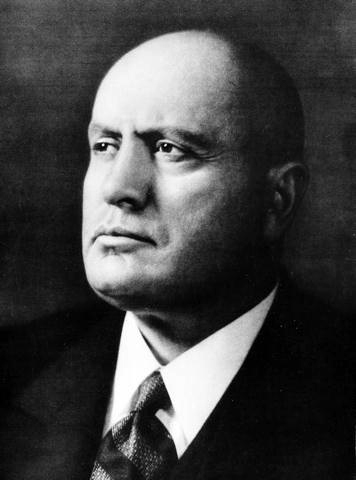Benito Mussolini
Blacksmith Alessandro Mussolini and his school teacher wife, Rosa, welcomed their son Benito Mussolini on 29 July, 1883, near Predappio in the north-east of Italy. He grew up in a household of strong political beliefs and this shaped his future path.
Benito Mussolini was born near Predappio, north-east Italy, on 29 July 1883. His father Alessandro, a blacksmith, was a socialist and a republican and his strong beliefs shaped those of his son. Although Rosa, Mussolini’s mother, also worked, the family was poor and as soon as Mussolini was old enough he went to work alongside his father in his forge.
Alessandro believed that the Italian monarchy was outdated and should be scrapped and that the division of wealth in the country should be split in a fairer manner. He felt that it should be the choice of the general public as to who was in charge, rather than the current system which saw the royal family hand down control through the generations. He also firmly believed that every Italian should exist under Italian rule, rather than some living under the control of Austria in the Austro-Hungarian Empire. The Roman Catholic Church was a source of tension within Mussolini’s home when he was growing up, as his father felt that the Church was Italy’s enemy because it did not support the state.

As a result of all these strong viewpoints on politics and religion, Mussolini found the rigid rules of school difficult to cope with and was expelled from a school he attended that was run by Catholic monks. He eventually found a school that fit and went on to become a teacher, but behind this career was a true passion for politics.
He travelled to Switzerland in June of 1902, joining a trade union when he was working as a bricklayer in order to make ends meet. He was subsequently forced to leave the country the following year after he suggested a general strike to the union. Mussolini returned to his home country and completed his military service, after which point he travelled to Trentino in northern Italy. This area was overseen by the Austrians and Mussolini was eventually pushed out of Trentino in 1909, due to his attacks on the Church and his stirring up of the trade unions.
Fast forward to 1911 and Mussolini led actions against the attack by Italy on Libya in north Africa. As a result of this, he was jailed for five months, but he had caught the attention of socialist groups and was taken on as Editor of ‘Avanti,’ the socialist newspaper in April of 1912. This boosted his influence dramatically and saw his views reach a vast number of Italians across the country.
At the outbreak of World War One, Mussolini initially railed against the conflict, however he soon became a supporter of it, calling it a “great drama.” “It is to you, young men of Italy…..that I address my call to arms…..Today I am forced to utter loudly and clearly in sincere good faith the fearful and fascinating word – war!” he said.
Mussolini resigned from Avanti in October of 1915, and was expelled from the Socialist Party partly due to this and partly because other members of the party were no longer confident he shared the same beliefs that they did. In August of 1915, Mussolini joined the Army, seeing promotion after promotion until he reached the rank of Corporal. However, he was injured by a mortar bomb two years after enlisting and was forced to retire from military service.
When the war ended, Mussolini was uncertain where his future lay. He was very interested in the views of Italian nationalist Gabriele D’Annunzio, who felt that Italy had been treated unfairly by the Treaty of Versailles. While Italy had fought for the Allies, the country received little in the way of a reward for being part of the winning side, some felt. Indeed, D’Annunzio felt that Italy had a right to certain territories in the Adriatic, such as Fiume. However, following the war, the port of Fiume was handed to the newly created Yugoslavia and D’Annunzio attempted to gain control of the area by force.
By this point, Mussolini was working as Editor of the newspaper Il Popolo d’Italia and was busy raising funds in support of D’Annunzio to help him achieve his goals.
See also:
MLA Citation/Reference
"Benito Mussolini". HistoryLearning.com. 2024. Web.
